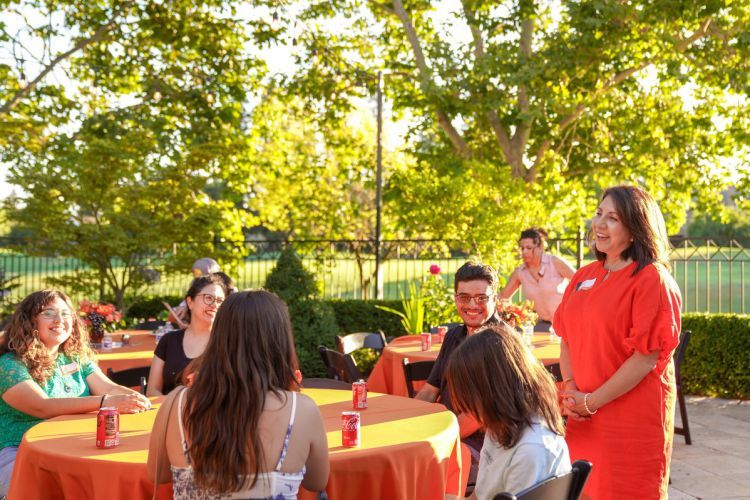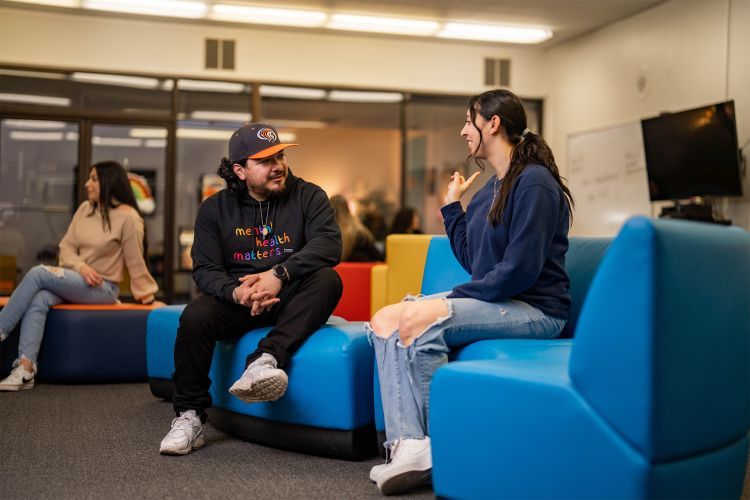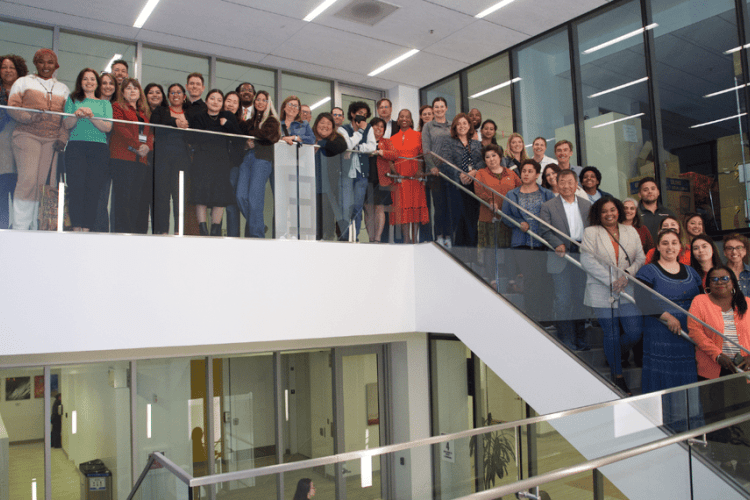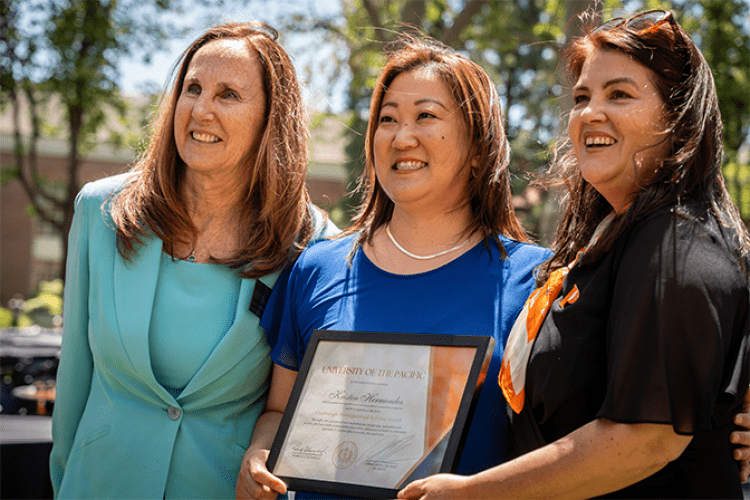Breadcrumb
Pacific designated Hispanic-Serving Institution, becomes nation’s highest-ranked private HSI university

Regent Leticia Robles (far right) speaks with students at Noche de Bienvenida.
The U.S. Department of Education designated University of the Pacific as a Hispanic-Serving Institution, giving the university new abilities to bolster the success of its growing Latino student population, officials announced today.
With the new designation, Pacific becomes the highest-ranked private university in the nation with HSI status.
“This is a critically important milestone in the 172-year history of California’s first and oldest university,” said Pacific President Christopher Callahan, who established the HSI designation as a primary strategic goal when he arrived in 2020. “The federal designation now means we will be able to compete for special resources to even better help our Latino students succeed, and continue to recruit the best, brightest and most deserving Latino students no matter their socioeconomic backgrounds.”
Congress created the Hispanic-Serving Institution program in 1992 as part of the expansion of the 1965 Higher Education Act. The initiative was championed by long-time higher education advocate Sen. Claiborne Pell, D-R.I., and signed into law by President George H.W. Bush. Federal funds for HSI were first set aside in 1995.
As a Hispanic-Serving Institution, Pacific can now compete for special federal grants to support Latino students in new and creative ways, expanding access to higher education and increasing the ability to complete degree programs.
There are more than 300 four-year universities designated as HSIs in the U.S., about half public colleges and universities and half private. Pacific is the highest-ranked private national university—as rated by U.S. News & World Report—to achieve HSI status.
“We are enormously proud of our history of being an institution that provides rigorous, high-quality academic programs coupled with access for qualified and deserving students, regardless of background,” Callahan said.
A recent New York Times study ranked Pacific No. 23 nationally for economic diversity of students and The Wall Street Journal rated Pacific No. 28 in social mobility. Additionally, a Georgetown University study ranked Pacific first in the nation in alumni career earnings for universities with high percentages of students attending college with Pell Grants, which are awarded based on need for low-income students.
“We are monomaniacally focused on the success of all our students,” the president said.

Students gather in El Centro, a place for Latino students to connect, access resources and enjoy rich programming.
Provost and Executive Vice President Gretchen Edwalds-Gilbert said the HSI designation will help Pacific better prepare students for the workforce after graduation and make Pacific an even more attractive place for employers to recruit the best and most diverse workforce.
“As employers are recruiting for internships and full-time jobs, they’re trying to diversify their workforce, so they want to go where they know there is a diverse and highly prepared body of students,” she said.
The provost also noted that Pacific’s increasingly diverse student body is attracting more diverse faculty. “They are saying, ‘This is where I want to be. These are the students I want to teach’,” she said.
Mary Lomax-Ghirarduzzi, Pacific’s inaugural vice president for Diversity, Equity and Inclusion who led an early task force to prepare for the anticipated HSI designation, said research shows HSI universities measurably improve the retention and graduation rates of other underserved student populations, as well as Latinos.
“This is really about how to make all students more successful,” she said.
Pacific was already an Asian American and Native American Pacific Islander-Serving Institution as designated by the U.S. Department of Education.
To receive the HSI designation, a university’s undergraduate student population must be at least 25% Hispanic. Under the leadership of Vice President Chris Ferguson, the Hispanic undergraduate enrollment at Pacific increased steadily and swiftly—from 20.9% in Fall 2019 to 26.7% today. Previously, the population hovered between 18% and 20%.
The Hispanic population in California is 40% and 19% nationwide, according to the U.S. Census Bureau.
President Callahan established the HSI designation as a strategic goal in 2020 upon his arrival from Arizona State University. At ASU, he created the first bilingual news writing classes; launched a weekly Spanish-language newscast with Univision and a Spanish-language news website, Cronkite Noticias, with the Raza Development Fund; built an immersive professional reporting program covering Latino issues and the U.S.-Mexico border; recruited award-winning Latino faculty; and brought the California Chicano News Media Association: Latino Journalists of California from USC to ASU during his years as dean of the Walter Cronkite School of Journalism and Mass Communication. He received ASU’s first Catalyst Award for Equity and Inclusion, the inaugural ASU Institutional Inclusion Award and a special commendation from the Arizona House of Representatives for his work in the Hispanic community.
Board of Regents Chair Mary-Elizabeth Eberhardt ‘76 called the new designation “a historic moment for our students—both current students and those who will one day call Pacific home.
“My family and I have been involved at Pacific for decades, and I am proud of the university’s commitment to making a college education accessible for students from diverse backgrounds, and how I’ve seen that commitment grow and solidify over the years. As Regents we hear often from students who say they wouldn’t have been able to go to college without the support Pacific gave them. Their courage and perseverance inspire me. Today, we celebrate one more way that University of the Pacific is walking the walk for these students.”
Eberhardt and Callahan were joined in the HSI announcement in the DeRosa University Center by Regent Leticia Robles ’89, founder and president of Pacific Homecare Services, ASuop President Izzi Gomez ’24, and former Regent Jose Hernandez ‘84, who was the subject of the recent film, “A Million Miles Away,” about his inspirational journey from migrant farmworker to NASA astronaut.





